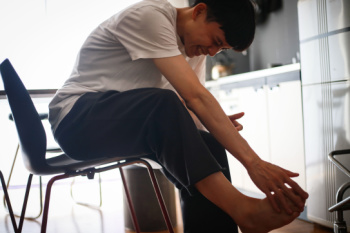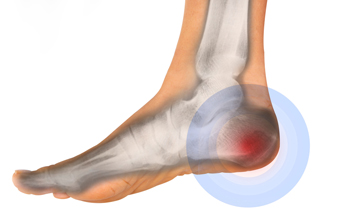April 2024
Treating Ankle Sprains
 Ankle sprains are injuries that occur when the ligaments that support the ankle stretch beyond their limits or tear. These injuries are often caused by twisting the ankle during physical activities, such as sports or even walking on uneven surfaces. Treatment for ankle sprains ranges from conservative to more intensive approaches, depending on the severity of the sprain. Initial treatment for mild sprains typically includes rest and elevation to reduce swelling and pain. More severe sprains may require immobilization with a brace or cast to allow the ligaments to heal properly. Certain stretches may be recommended to restore ankle strength, flexibility, and balance, and prevent future sprains. In cases where the ligament damage is extensive and stability is compromised, surgical intervention may be considered to repair the ligaments. If you have sprained your ankle, it is suggested that you promptly schedule an appointment with a podiatrist to get the right treatment.
Ankle sprains are injuries that occur when the ligaments that support the ankle stretch beyond their limits or tear. These injuries are often caused by twisting the ankle during physical activities, such as sports or even walking on uneven surfaces. Treatment for ankle sprains ranges from conservative to more intensive approaches, depending on the severity of the sprain. Initial treatment for mild sprains typically includes rest and elevation to reduce swelling and pain. More severe sprains may require immobilization with a brace or cast to allow the ligaments to heal properly. Certain stretches may be recommended to restore ankle strength, flexibility, and balance, and prevent future sprains. In cases where the ligament damage is extensive and stability is compromised, surgical intervention may be considered to repair the ligaments. If you have sprained your ankle, it is suggested that you promptly schedule an appointment with a podiatrist to get the right treatment.
Ankle sprains are common but need immediate attention. If you need your feet checked, contact one of our podiatrists from Central Ohio Comprehensive Foot Care. Our doctors can provide the care you need to keep you pain-free and on your feet.
How Does an Ankle Sprain Occur?
Ankle sprains take place when the ligaments in your ankle are torn or stretched beyond their limits. There are multiple ways that the ankle can become injured, including twisting or rolling over onto your ankle, putting undue stress on it, or causing trauma to the ankle itself.
What Are the Symptoms?
- Mild to moderate bruising
- Limited mobility
- Swelling
- Discoloration of the skin (depending on severity)
Preventing a Sprain
- Wearing appropriate shoes for the occasion
- Stretching before exercises and sports
- Knowing your limits
Treatment of a Sprain
Treatment of a sprain depends on the severity. Many times, people are told to rest and remain off their feet completely, while others are given an air cast. If the sprain is very severe, surgery may be required.
If you have suffered an ankle sprain previously, you may want to consider additional support such as a brace and regular exercises to strengthen the ankle.
If you have any questions please feel free to contact one of our offices located in Delaware and Westerville, OH . We offer the newest diagnostic and treatment technologies for all your foot and ankle needs.
Hammertoe Surgery Risk Factors

Hammertoe is a deformity of the second, third, or fourth toe that causes a bend at the middle joint so that it resembles a hammer. A hammertoe can significantly affect mobility and cause discomfort, especially while wearing shoes. Conservative treatment measures include wearing proper footwear and orthotics, but more severe cases may necessitate surgical intervention which carries certain risks. Post-operative complications may include pain, swelling, and difficulty in weight bearing. Nerve damage leading to sensations of numbness or tingling, reduced range of motion in the toe, and the risk of infection at the surgical site are further risk factors. Additionally, there is a possibility of the toe not sitting completely flat on the ground after surgery, which can affect balance and mobility. To determine the best course in managing a hammertoe, it is suggested that you schedule an appointment with a podiatrist to find out if surgery is right for you.
Foot surgery is sometimes necessary to treat a foot ailment. To learn more, contact one of our podiatrists of Central Ohio Comprehensive Foot Care. Our doctors will assist you with all of your foot and ankle needs.
When Is Surgery Necessary?
Foot and ankle surgery is generally reserved for cases in which less invasive, conservative procedures have failed to alleviate the problem. Some of the cases in which surgery may be necessary include:
- Removing foot deformities like bunions and bone spurs
- Severe arthritis that has caused bone issues
- Cosmetic reconstruction
What Types of Surgery Are There?
The type of surgery you receive will depend on the nature of the problem you have. Some of the possible surgeries include:
- Bunionectomy for painful bunions
- Surgical fusion for realignment of bones
- Neuropathy decompression surgery to treat nerve damage
Benefits of Surgery
Although surgery is usually a last resort, it can provide more complete pain relief compared to non-surgical methods and may allow you to finally resume full activity.
Surgical techniques have also become increasingly sophisticated. Techniques like endoscopic surgery allow for smaller incisions and faster recovery times.
If you have any questions please feel free to contact one of our offices located in Delaware and Westerville, OH . We offer the newest diagnostic and treatment technologies for all your foot and ankle needs.
Common Symptoms and Causes of Gout

Gout, an inflammatory ailment caused by excess uric acid, often triggers sudden and severe joint pain. Commonly affecting the big toe, gout attacks are often described as feeling like a fracture or a severe burn. Along with the intense pain, symptoms include visible swelling, redness, and inflammation in the affected joint, making movement difficult and leading to stiffness. These symptoms tend to worsen over time if left untreated, potentially causing joint deformity and long-term complications. Recurrent gout attacks can occur in clusters, affecting both mobility and overall quality of life. Seeking professional help from a podiatrist is essential for comprehensive care, including diagnosis, treatment, and long-term management. Podiatrists can offer a combination of medication, lifestyle adjustments, and preventive strategies to alleviate gout symptoms and reduce the risk of future attacks. If you experience such painful symptoms, particularly in your big toe, it is suggested that you are under the care of a podiatrist for treatment.
Gout is a foot condition that requires certain treatment and care. If you are seeking treatment, contact one of our podiatrists from Central Ohio Comprehensive Foot Care. Our doctors will treat your foot and ankle needs.
What Is Gout?
Gout is a type of arthritis caused by a buildup of uric acid in the bloodstream. It often develops in the foot, especially the big toe area, although it can manifest in other parts of the body as well. Gout can make walking and standing very painful and is especially common in diabetics and the obese.
People typically get gout because of a poor diet. Genetic predisposition is also a factor. The children of parents who have had gout frequently have a chance of developing it themselves.
Gout can easily be identified by redness and inflammation of the big toe and the surrounding areas of the foot. Other symptoms include extreme fatigue, joint pain, and running high fevers. Sometimes corticosteroid drugs can be prescribed to treat gout, but the best way to combat this disease is to get more exercise and eat a better diet.
If you have any questions please feel free to contact one of our offices located in Delaware and Westerville, OH . We offer the newest diagnostic and treatment technologies for all your foot and ankle needs.
How Being Overweight Affects the Feet

Studies show that carrying extra weight puts a significant amount of pressure on the feet, leading to various issues. For instance, overweight individuals are more likely to experience general foot pain and especially discomfort in the bottom of the heels when walking. Additionally, their feet might appear flatter, and they may have difficulty moving them as freely as they should. This is because extra weight can alter the foot's mechanics, causing it to roll inward more during walking. Furthermore, it is important to note that it is not just about the overall weight but also where the body stores fat. Excess fat, particularly around the feet, can increase foot pain. A podiatrist can offer personalized strategies to alleviate discomfort and improve foot function. If you are experiencing foot problems that may be connected to your weight, it is suggested that you schedule an appointment with a podiatrist for help.
Obesity has become very problematic at this point in time and can have extremely negative effects on the feet. If you’re an obese individual and are concerned about your feet, contact one of our podiatrists from Central Ohio Comprehensive Foot Care. Our doctors can provide the care you need to keep you pain-free and on your feet.
Obesity and Your Feet
Since your feet are what support your entire weight when standing, any additional weight can result in pain and swelling. Being overweight is one of the main contributors to foot complications.
Problems & Complications
Extra Weight – Even putting on just a few extra pounds could create serious complications for your feet. As your weight increases, your balance and body will shift, creating new stresses on your feet. This uneven weight distribution can cause pain, even while doing the simplest tasks, such as walking.
Diabetes – People who are overweight are at serious risk of developing type-2 diabetes, which has a drastic impact on the health of your feet. As you get older, your diabetes might worsen, which could lead to loss of feeling in your feet, sores, and bruises. You could also become more prone to various infections.
Plantar fasciitis – Pressure and stress that is placed on muscles, joints, and tendons can trigger plantar fasciitis, which is an inflammation of tissue that forms along the bottom of the foot.
If you have any questions please feel free to contact one of our offices located in Delaware and Westerville, OH . We offer the newest diagnostic and treatment technologies for all your foot and ankle needs.
Heel Pain Can Be Treated!
Diagnosis of Conditions Causing Heel Pain
 Diagnosing the cause of heel pain usually involves a comprehensive approach to identify the underlying issue accurately. First, a podiatrist will conduct a detailed medical history and physical examination, focusing on the foot to assess pain location, tenderness, and the presence of any swelling or abnormalities. The doctor may ask about the type of pain experienced, its onset, and any activities that exacerbate or relieve it. To further pinpoint the cause of heel pain, imaging tests such as X-rays, MRI scans, or ultrasounds may be utilized. These tools help a podiatrist visualize the internal structure of the foot, revealing issues like plantar fasciitis, heel spurs, or other soft tissue injuries. In certain cases, blood tests might be ordered to rule out systemic conditions, such as arthritis or gout, that can cause heel pain. Through this process, podiatrists can determine the specific cause of heel pain, allowing them to devise a targeted treatment plan that addresses the root of the problem. If you are suffering from heel pain, it is suggested that you contact a podiatrist today to begin the diagnostic process.
Diagnosing the cause of heel pain usually involves a comprehensive approach to identify the underlying issue accurately. First, a podiatrist will conduct a detailed medical history and physical examination, focusing on the foot to assess pain location, tenderness, and the presence of any swelling or abnormalities. The doctor may ask about the type of pain experienced, its onset, and any activities that exacerbate or relieve it. To further pinpoint the cause of heel pain, imaging tests such as X-rays, MRI scans, or ultrasounds may be utilized. These tools help a podiatrist visualize the internal structure of the foot, revealing issues like plantar fasciitis, heel spurs, or other soft tissue injuries. In certain cases, blood tests might be ordered to rule out systemic conditions, such as arthritis or gout, that can cause heel pain. Through this process, podiatrists can determine the specific cause of heel pain, allowing them to devise a targeted treatment plan that addresses the root of the problem. If you are suffering from heel pain, it is suggested that you contact a podiatrist today to begin the diagnostic process.
Many people suffer from bouts of heel pain. For more information, contact one of our podiatrists of Central Ohio Comprehensive Foot Care. Our doctors can provide the care you need to keep you pain-free and on your feet.
Causes of Heel Pain
Heel pain is often associated with plantar fasciitis. The plantar fascia is a band of tissues that extends along the bottom of the foot. A rip or tear in this ligament can cause inflammation of the tissue.
Achilles tendonitis is another cause of heel pain. Inflammation of the Achilles tendon will cause pain from fractures and muscle tearing. Lack of flexibility is also another symptom.
Heel spurs are another cause of pain. When the tissues of the plantar fascia undergo a great deal of stress, it can lead to ligament separation from the heel bone, causing heel spurs.
Why Might Heel Pain Occur?
- Wearing ill-fitting shoes
- Wearing non-supportive shoes
- Weight change
- Excessive running
Treatments
Heel pain should be treated as soon as possible for immediate results. Keeping your feet in a stress-free environment will help. If you suffer from Achilles tendonitis or plantar fasciitis, applying ice will reduce the swelling. Stretching before an exercise like running will help the muscles. Using all these tips will help make heel pain a condition of the past.
If you have any questions please contact one of our offices located in Delaware and Westerville, OH . We offer the newest diagnostic and treatment technologies for all your foot and ankle needs.









